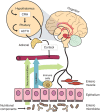Impact of nutrition on brain development and its neuroprotective implications following preterm birth
- PMID: 25314585
- PMCID: PMC4291511
- DOI: 10.1038/pr.2014.171
Impact of nutrition on brain development and its neuroprotective implications following preterm birth
Abstract
The impact of nutrition on brain development in preterm infants has been increasingly appreciated. Early postnatal growth and nutrient intake have been demonstrated to influence brain growth and maturation with subsequent effects on neurodevelopment that persist into childhood and adolescence. Nutrition could also potentially protect against injury. Inflammation and perinatal infection play a crucial role in the pathogenesis of white matter injury, the most common pattern of brain injury in preterm infants. Therefore, nutritional components with immunomodulatory and/or anti-inflammatory effects may serve as neuroprotective agents. Moreover, growing evidence supports the existence of a microbiome-gut-brain axis. The microbiome is thought to interact with the brain through immunological, endocrine, and neural pathways. Consequently, nutritional components that may influence gut microbiota may also exert beneficial effects on the developing brain. Based on these properties, probiotics, prebiotic oligosaccharides, and certain amino acids are potential candidates for neuroprotection. In addition, the amino acid glutamine has been associated with a decrease in infectious morbidity in preterm infants. In conclusion, early postnatal nutrition is of major importance for brain growth and maturation. Additionally, certain nutritional components might play a neuroprotective role against white matter injury, through modulation of inflammation and infection, and may influence the microbiome-gut-brain axis.
Figures

References
-
- Clouchoux C, Guizard N, Evans AC, du Plessis AJ, Limperopoulos C. Normative fetal brain growth by quantitative in vivo magnetic resonance imaging. Am J Obstet Gynecol. 2012;206:173.e1–8. - PubMed
-
- Hüppi PS, Warfield S, Kikinis R, et al. Quantitative magnetic resonance imaging of brain development in premature and mature newborns. Ann Neurol. 1998;43:224–35. - PubMed
-
- Dubois J, Benders M, Cachia A, et al. Mapping the early cortical folding process in the preterm newborn brain. Cereb Cortex. 2008;18:1444–54. - PubMed
-
- Volpe JJ.Neurology of the Newborn5th ed. Philadelphia, PA; Elsevier; 2008
Publication types
MeSH terms
Substances
LinkOut - more resources
Full Text Sources
Other Literature Sources
Medical

